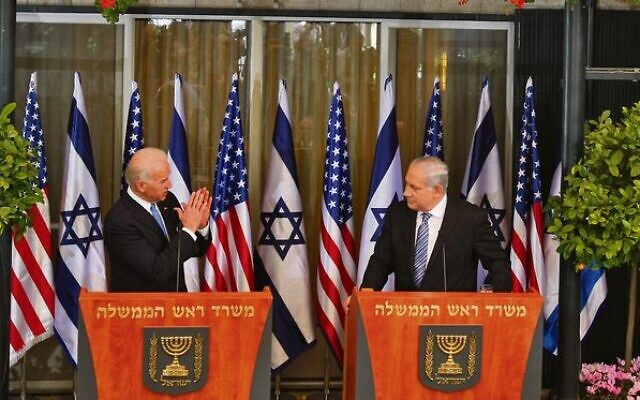Biden talks Israeli cabinet, Saudi deal
Despite the lack of invitation, Biden stressed that he has been an "unyielding supporter of Israel for ... as long as I have been around".

(TIMES OF ISRAEL) – US President Joe Biden said on Sunday that Israeli Prime Minister Benjamin Netanyahu’s coalition government has some “of the most extreme members” he’s seen in Israel, and that cabinet ministers who back settling “anywhere they want” in the West Bank are “part of the problem” in the conflict.
The comments indicated that Biden does not completely buy Netanyahu’s insistence that he is in control of his coalition and that his far-right partners answer to him – and not the other way around.
In addition to offering rare comments during a CNN interview on his thoughts about the Israeli government, he provided an update on his administration’s effort to broker a normalisation deal between Israel and Saudi Arabia, saying, “We’re a long way from there.”
Biden was pressed on what it would take for him to extend an invitation to Netanyahu to visit the White House, but he dodged the question, noting that Israeli President Isaac Herzog will be coming to Washington next week.
Herzog was invited by Congressional leaders to address a joint session in honour of Israel’s 75th year of independence. He is also expected to meet with Biden at the White House, but those invites are traditionally extended only a few days ahead of time.
Netanyahu, on the other hand, has yet to receive an invitation, even though he’s been back in office for over six months. Previous prime ministers – himself included – had made the trip by this stage in their terms. Biden told reporters in late March that Netanyahu would not be coming in the “near term” amid US frustration over the Israeli government’s effort to radically overhaul the country’s judiciary.
Despite the lack of invitation, Biden stressed that he has been an “unyielding supporter of Israel for … as long as I have been around”.
As for Netanyahu, Biden said, “I think, [he] is trying to [figure out] how he can work through his existing problems in terms of his coalition.
“I’m one of those who believes that Israel’s ultimate security rests in a two-state solution,” Biden then said, and went on, “…This is one of the most extreme members of cabinets that I have seen. And I go all the way back to Golda Meir and all. Not that she was extreme, but I go back to that era.”
Indeed, none of the cabinet members have gone on record in recent years backing a two-state solution, and many back annexing large parts of the West Bank without granting equal rights to Palestinians in those areas. Netanyahu even told his party last month that Israel must “crush” Palestinian aspirations for a state.
Netanyahu’s coalition includes far-right lawmakers Bezalel Smotrich, who serves as Finance Minister, and Itamar Ben Gvir, the National Security Minister, both of whom vowed to oppose a series of measures aimed at bolstering the PA and have voiced fierce opposition to the prospect of a Palestinian state, pushing for settlement expansion and more Israeli control in the West Bank.
Washington has steered clear of both ministers in Netanyahu’s government, and has expressed deep misgivings about them.
Last month, the White House expressed alarm over the sway the right wing of Netanyahu’s coalition has over policy, especially settlements and judicial reform. Three Biden administration officials acknowledged to The Times of Israel in June that Washington is not convinced the long-time Likud leader is in control.
Biden added that the Palestinian Authority “has lost its credibility”, though not only because of Israel. As a result, a “vacuum for extremism” has been created among the Palestinians. “There are some very extreme elements,” he said.
As for a possible Israel–Saudi Arabia normalisation deal, Biden said, “We’re a long way from there. We got a lot to talk about.
“We’re making progress in the region, [but a normalisation deal] depends upon the conduct and what is asked of us for them to recognise Israel,” the President said.
“Quite frankly, I don’t think they have much of a problem with Israel,” he noted.
“Whether or not we would provide a means by which [Saudi Arabia] could have civilian nuclear power [and whether the US could] be a guarantor of their security – that’s … a little way off,” Biden said.

comments